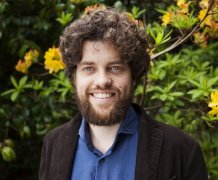articles

Professor Edze Westra
Researchers aim to discover how viruses communicate
The different "languages" used by viruses will be investigated by a new research project at the University of Exeter.
Recent research has shown that many phages (viruses that affect bacteria) use "molecular communication" to coordinate infections – deciding when to lie dormant and when to replicate in infected cells.
Professor Edze Westra will lead a team to investigate this further, supported by a new grant of two million euros from the European Research Council (ERC).
Phages are the most abundant biological entities on Earth, and phage therapy offers a promising alternative to antibiotics.
"I am absolutely delighted that my ERC Consolidator Grant proposal has been selected for funding," said Professor Westra, of the Environment and Sustainability Institute at Exeter's Penryn Campus in Cornwall.
"This will enable me to work on one of the most exciting areas in virology for the next five years, to understand why and how viruses communicate with one another".
He added: "Different phages use different communication molecules to coordinate infections, effectively causing them to speak different languages.
"The discovery that viruses can communicate to make group decisions about their infection strategy raises many pressing questions.
"How widespread is the ability of viruses to communicate? Why do not all viruses communicate? What drives the diversification of viral communication systems?"
The team will combine theoretical, experimental and observational approaches to address these questions, making this the first research project to address the evolutionary ecology of viral communication systems.
The ERC has announced a total of 313 new Consolidator Grants, with funding of 632 million euros.
The grants will support mid-career researchers and will help them consolidate their teams and conduct pioneering research.
Part of the EU’s Horizon Europe programme, this new round of grants will create an estimated 1,900 jobs for postdoctoral fellows, PhD students and other staff at 189 host institutions.
ERC President Professor Maria Leptin said: "Even in times of crisis and conflict and suffering, it is our duty to keep science on track and give our brightest minds free reign to explore their ideas.
"We do not know today how their work might revolutionise tomorrow – we do know that they will open up new horizons, satisfy our curiosity and most likely help us prepare for unpredictable future challenges.
"So, I am thrilled to see a new group of ERC grant winners funded for their scientific journey. I wish them the best of luck on their way to push the frontiers of our knowledge."
Date: 17 March 2022
